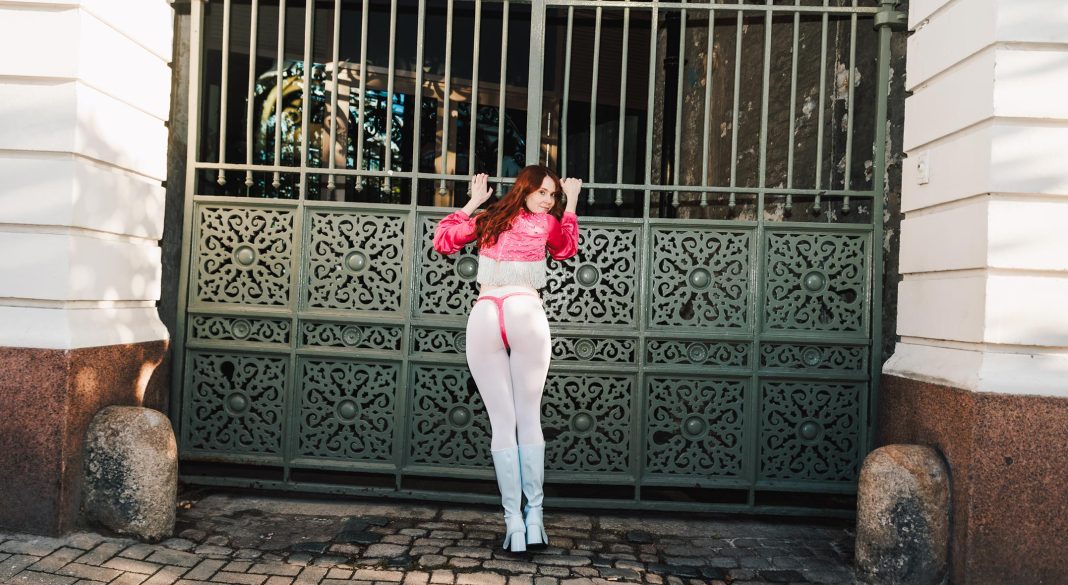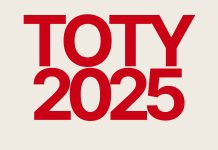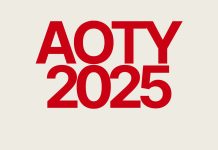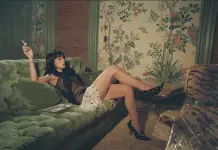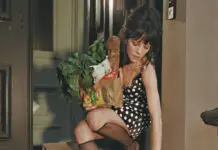At this point, it’s no secret that if you want to make money as a musician, you have to think outside of the box. Sometimes, you might even need to think outside of your immediate industry. Enter indie-pop stalwart Kate Nash, who had a novel idea as to how she might accommodate the costs of putting on live show. Behold, the BUTTSForTourBuses campaign, or rather, in Kate’s own words: “Please buy my merch or my arse on my new ONLYFANS account katenyash87 to support me paying great wages & putting on a high-quality show as I will not sacrifice either of things”.
The motivation is fairly simple. To pay for the logistics and fair salaries that make an independent tour run — buses, a live band, a staging and lighting crew — Nash has realised that photos of her ass work a lot harder than her current streaming revenue, which she estimates to be around “0.003 of a penny per stream”. But while Nash wrote on Instagram that “Mostly, people I respect have told me I’m punk as fuck & that they are proud of me & my fans are excited”, she also wanted to “address the words ‘sad’ & ‘need’ being thrown around”.
In fact, some of those critiques have been downright vicious, accusing Nash of being a bad feminist, a lewd attention seeker, and somebody who is living well beyond her means if it means she has to ‘degrade’ themselves to such an extent. It’s a very similar story to that of fellow noughties breakthrough artist Lily Allen, who experienced enormous pushback and shock-tabloid coverage in October when she revealed that by selling pictures of her feet, she was making more money from 1000 fetish buyers than she was her nearly eight million monthly listeners on Spotify.
Debate as to whether foot pictures and bum snaps constitute ‘sex work’ is perhaps a bit too complicated to get into here, but what we can unpack is the growing popularity of the musician-to-sexy-content-creator pipeline. Undeniably, there is something pretty depressing about a climate where the music itself can not be the main driver of an artist’s income. But even though the lack of evenly distributed funds in the industry has been well documented, people still seem unaware of just how tough things have become. There is a lot of misinformation (and just general mystery) as to how exactly streaming income breaks down, with individual artist payouts varying significantly depending on platform, popularity and the exact nature of the deal they have with their label or distributor. But whichever way you want to slice it, the math isn’t really math-ing for most. In fact, statistics suggest a deeply widening gulf: whilst the Drakes and Beyoncés and Taylor Swifts of this world can make pretty decent money (Drake taking a reported top-earning $52.5m from 21.5 billion streams in 2023), Spotify made the decision in April 2024 to demonetise any song which had under 1000 plays, cutting off a bunch of fake content but also blockading the work of small legitimate artists in the process.
In the mid-section of the industry, competition has never been fiercer, and even those who appear relatively successful — Little Simz, Rachel Chinouriri, Animal Collective — have been open about the need to cancel tours, struck down by escalating Visa costs, a cost-of-living crisis and dwindling government support. Artists can attempt to recoup through merch and meet-and-greets or sponsored brand deals, but for those not yet at a stadium level, it is a real uphill hike, pushing artists to lean heavily on their most committed fans if they wish to stay afloat.
For artists like Lily Allen and Kate Nash who came in at the tail end of record label advances and physical sales, this changing status quo is a particularly rude awakening, and one that’s incompatible with the vision that they might have for their careers, families or live performances. If you can sell a few feet pics between cycles, that may well be more preferable to trying to secure other forms of part-time income that are pretty inaccessible to the average public figure. After all, it’s distinctly unlikely that Lily Allen could pick up a few shifts working the Boxing Day sales (although she does have a successful BBC podcast which many have claimed is income enough).
Whilst some of the concerns about what musicians might choose to do to make up the deficit might feel valid, a lot of them come burdened by pretty negative stereotypes and assumptions regarding the ‘shame’ of sex work. It also comes with some preconceptions about OnlyFans as a whole. Yes, it’s a sex site, first and foremost. But for several years now, it’s also become a more general fan-use platform, offering its creators a profit-share deal which compares to the likes of Patreon, GoFundMe or Cameo. Whether they’re selling sexy content, ‘day in the life’ footage or just wanting to chat with a more self-selecting audience, various musicians have given OnlyFans a go: Cardi B joined the platform back in 2020 to share bts content from the ‘WAP’ video shoot (“NO I WONT BE SHOWING PUSSY , TITTIES AND ASS”), whilst various other rap figures have dabbled in it as a way to soft-launch new musical releases: Swae Lee, Rico Nasty and Rubi Rose to name but a few.
Even when the content is on the more risqué side, kicking off about artists who make it feels naive to the idea that music and sex(uality) have always been entwined. Critiques of the porn industry and its misogynistic commodification of women’s bodies are perfectly valid; before Nash turned off her Instagram comments, some posters made fair points about how her playful approach to the subject could be perceived as trivialising the more harrowing circumstances of those who truly have no other option but to put themselves in potentially vulnerable positions if they wish to feed their families. But in a world where female popstars are frequently expected to dress sexily on stage or in photoshoots, it seems to be the element of unapologetic transaction which makes most people feel uncomfortable. When Kate Nash looks hot on stage, that’s cool. But when she monetises that gaze, the perception is that there is something tawdry or desperate about the directness of the ask, even when she explains that it will directly influence the sustainability of her musical career. This ties right back to judgements around sex work more broadly, perceiving it as an exclusively rock-bottom choice rather than a digitally-savvy revenue model which is earning an increasing amount of people a lot of money on their own flexible terms.
At worst, some of the most aggressive vitriol aimed at Kate Nash from her apparent fans actually feels like an extension of the current ‘stan’ trend of infantilisation and control towards female artists, dressed up under the guise of care. But ultimately, fussing over Nash’s bum or Allen’s feet only serves to distract us from the bigger issues. Sex-related work is always going to be deeply individual; what feels empowering for some isn’t for others, and that’s absolutely fine. If OnlyFans-esque content isn’t something that a musician wants to partake in, then it is of course deeply wrong that they might ever feel pressured into it, or that Allen or Nash’s success on such platforms could become used as a coercive example of what all female artists ‘should’ be doing. But refusing to understand why it’s becoming such a viable option for many artists is simply akin to being a little bit prudish. Kate Nash’s butt pics are ultimately quite silly and cheeky, not exactly in line with people’s perceptions of NFSW degradation. But even if they were, she has the right to define what she’s comfortable with, and to find a little frivolity in the discourse and puns around her bum (her fingertips are holding onto the cracks in her foundations, etc etc).
Kate Nash’s physicality is far from the most interesting thing about her; her live show is a calibre that is well worth your money regardless of what you think about her ass. But in lots of ways, this campaign has worked better than she might of imagined. She’s raised her required money, reignited conversation around the current state of touring revenue, and likely, brought a bunch of new listeners along for the ride.
“Are you sad music has little to no value?” she writes on Instagram. “Would you be interviewing me or writing about me or talking about me if I had simply posted ‘going on tour, the business is shit, help me protect my employees & the integrity of my show?…fuck no…my arse is shining a light on the problem. Honestly, I’m such a legend for this”. Whether she’s your kind of legend or not, ButtsForBuses is a sobering reminder that as music fans, we shouldn’t hate the player at the expense of acknowledging the game.
Buy tickets to see Kate Nash live at her two remaining 2024 dates in Belfast and Dublin or next April in London.


